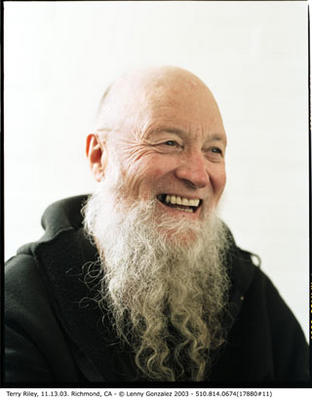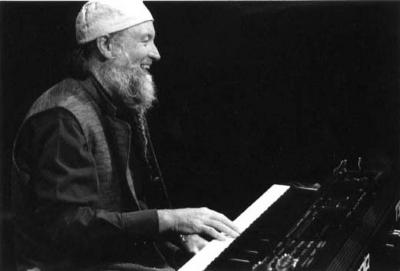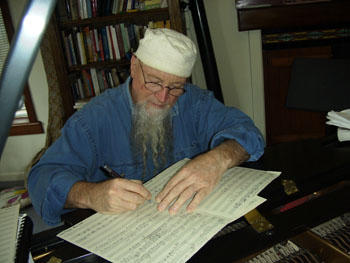 Terry Riley has turned 70 and there have been a number of celebrations over the course of this year. Last night these observances concluded in Los Angeles at UCLA's Royce Hall. HurdAudio observed the proceedings from the back of the main floor as an eclectic audience paid tribute to this influential composer of wide appeal.
Terry Riley has turned 70 and there have been a number of celebrations over the course of this year. Last night these observances concluded in Los Angeles at UCLA's Royce Hall. HurdAudio observed the proceedings from the back of the main floor as an eclectic audience paid tribute to this influential composer of wide appeal.David Sefton, the director of UCLA Live, introduced each segment of the evening's concert with enthusiasm and openly expressed passion that bordered on excessive as he declared Riley a "genius, national treasure, etc." multiple times and even led the audience in an unrehearsed "Happy Birthday" after the intermission. I completely share this enthusiasm. Terry Riley's music has meant a great deal to me over the years. My first exposure was A Rainbow in Curved Air in my teens. I am deeply familiar with that pairing of "A Rainbow in Curved Air" and "Poppy Nogood and the Phantom Band." There have been stretches where I listened to "Cadenza on the Night Plain" to the exclusion of just about everything else. And "The Harp of New Albion" plays into my twin obsessions with epic solo piano composition and just intonation. (A severely underrated composition in my opinion.) "In C" is a great, and enduring work. And there are many more Riley compositions that have caught my ear or remain to do so. A genius? A national treasure? Easily. And yet 70 seems too soon to make a retrospective evaluation as there is so much yet to be heard from this man. So let's hear it for the "first" 70 years and look forward to the next.

The evening began with a tribute work for electronics and video composed and performed by Matmos (Drew Daniel and M.C. Schmidt). Much of the manipulated source material was taken from recordings of the Kronos Quartet practicing "Sunrise of the Interplanetary Dream Collector." That's another Riley composition I'm deeply familiar with and adore. The elements of that piece that did poke through the texture managed to whet my appetite for hearing that great work again. The video elements were somewhat troubling. If the concrete nature of text in music is an aesthetic hurdle for me then video is even more so with the loaded concrete quality of video images slapping hard against the abstract beauty of the music. It took a moment to locate the conceptual unity between the video and sound as eventually the video loops did sweep me into the experience with the cyclical musical material.
This was followed by a series of pieces arranged for piano-four hands performed by Sarah Cahill and Joseph Kubera. This was the highlight of the evening for me. I was expecting to hear Riley's fantastic "Keyboard Studies" with their dense textures and static energy. Instead, these arrangements were from other works and much of it was new to me. These were intricate compositions that unfolded with the kind of narrative form reminiscent of "Cadenza on the Night Plain" or "Salome Dances for Peace." I would love to study the scores that Cahill and Kubera were playing from. I would love to hear the original instrumentations that these four-hand arrangements were taken from. And in the case of the final work they performed; I'd love to hear that one arranged for a large jazz ensemble (like the NOW Orchestra) as an improvising ensemble would preserve the spontaneous feel of that work while spreading those lush harmonies across a timbre field of horns, reeds and rhythm section. It's pieces like these that hint at how rich the creative output of Terry
 Riley really is.
Riley really is.The second half of the program began with Riley performing "A Rainbow In Curved Air" as a trio of two keyboards and William Winant on percussion (thanks Heather, it was hard to see from the back of the room... I earier referred to him as "an East Indian percussionist." Completely my mistake. William Winant is a long-time champion of new music and a great percussionist deserving more credit). The long introduction had me questioning just how well I knew this composition as Riley vamped over some sequenced patterns, simple MIDI drum machine loops and live tabla. Then the familiar analog timbres and delays kicked in and this minimalist classic came on in full force with some nice touches from the live performers. This is another work I'd love to hear interpreted by a live, acoustic ensemble with digital delay (the Bang On A Can All-Stars perhaps? This work seems like a natural for the Cantaloupe label). I once heard a recording of Katrina Krimsky interpreting "A Rainbow in Curved Air" for piano a long time ago. This one is really due for a revival in any number of instrumentations and interpretations.
Then there were a couple of duets performed by Terry Riley and his son Gyan Riley on acoustic guitar. This was another high point in the evening. Gyan is an incredible guitarist (I was well aware of this fact, having been hooked on The Book of Abbeyozzud ever since its release) and these arrangements were spot on.
During the intermission I picked up on the anticipation and dread surrounding the final work on the program. The audience seemed evenly split between those who couldn't wait for and those who couldn't wait to flee the death/speed/heavy metal version of "In C" as performed by the Acid Mothers Temple.
On my copy of Reed Streams/ L'Infonie - In C (Mantra) on the Organ of Corti label there is a version of "In C" performed by Mantra in Montreal in 1970 that is a real treat. The idea of a death/speed/metal interpretation of "In C" is an intriguing idea and I hope to hear that someday as the Acid Mothers Temple attempt was a complete failure. The guitarist at least seemed to make some passing references to the composition as he actually played a handful of the 53 cells that make up the score. The rest of the band just seemed content to "jam" in C major for an extended period of time. The front-man noodled endlessly with a sine-tone to irritating effect and the drums would clock in with a dull rock pulse complete with unimaginative fills every four bars.
I've heard "In C" performed live several times. The thing that struck me last night was that a performance that actually adheres to the compositional process of slowly building a sonic texture from a unified set of cells has a greater visceral impact than the hyper-amplification of a heavy metal band. Even the Evergreen Gamelan Ensemble rocked this one harder than Acid Mothers Temple ever could. I fondly remember a 1990 Bang on a Can performance of "In C" with a monstrous ensemble making an insane racket that gave me a splitting headache even as I loved every second of it. "In C" can take a wide range of instrumentation and interpretation, but just playing something in C doesn't make it "In C."
Even with the death/speed/heavy metal disappointment it was great to hear Terry Riley's music in so many manifestations. 70 years is something to celebrate and this man is a "national treasure."


2 comments:
Mr. Winant will be amused by your "east Indian percussionist" reference.
That was Mr. Winant? I've heard him for years but never seen him. I am humbly corrected (he was not credited in my program).
Post a Comment